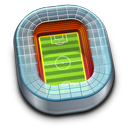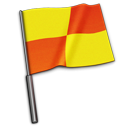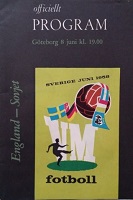 England
Football Online England
Football Online |
|
Results 1955-1960 |
Page Last Updated 2 May 2025 |
Союз
Советских Социалистических Республик |
|
|
 322 322
6.0 Sing It Again 6:30
Records: Sam Costa 7.0 Does The Team Think?
7.30 News 7.35 Semprini
Serenade
8.5 Football: England v. USSR
9.0 Hymns 9.30 Follow The
Stars: Norman Evans 10.30 News |
 |
|
 |
Sunday,
8 June
1958
The VM Coupe Jules Rimet Fotboll Finals
First Phase Pool 4
match one/two
England 2 USSR 2
[0-1]
|
|
 |
Nya Ullevi Stadion,
Heden, Göteborg, Västra Götalands Iän, Sweden
Kick-off (CET & BST): 7.00pm
Attendance:
'49,348' |
 |
|
USSR kicked off |
 |
|
[0-1]
Nikita Simonyan
13
Valentin Ivanov hit a shot from
edge of area that
McDonald parried into the path of Simonyan who tapped in from 3yds. |
[1-2]
Derek Kevan
header 65
Billy Wright
swung over a perfectly placed free-kick for Kevan to head in
[1-2] Bobby Robson scores
disallowed: foul
73
[2-2]
 Tom Finney
penalty 84 Tom Finney
penalty 84
'a
swift, pure flick with his right foot'
to the left of Yashin's goal and his reach.
(Krizhevsky fouled
Haynes)
|
[0-2]
Aleksandr Ivanov
56
dribbled around McDonald the slip the
ball left-footed into an empty net after picking up Boris Kuznetsov's
defence-splitting pass.
| To all intents and
purposes, this penalty kick should have been a free-kick, as
the foul was committed two metres outside the area. |
|
|
second half live on
the Radio Light Programme -
Commentator: Alan Clark |
|
|
|
 flg.jpg) "ENGLAND
SAVED IN PENALTY DRAMA" Daily Mirror "ENGLAND
SAVED IN PENALTY DRAMA" Daily Mirror |
  Officials Officials |
England
Party |
FIFA ruling on NO substitutes |
USSR Party |
Referee
(black blazer)
István Zsolt
36 (28 June 1921), Budapest |
There are no substitutions whatsoever in the World Cup Finals
matches.
Officially, USSR committed 27 fouls on the English, but there were so
many more.
England had seven corners to USSR's five. |
|
Linesmen |
Carl
Jørgensen
Denmark |
Birger
Nilsen
Norway |
|
FIFA Commissioner: James P. McGuire,
United States
|
|
|
|
flg.jpg) England
Team England
Team |
| |
|
Rank |
No official ranking system established;
ELO rating 4th |
Colours |
The 1954 Umbro
home uniform -
White v-necked short-sleeved continental jerseys, blue shorts, red
socks with white calf hoop. |
|
P 29th of 43, W 17 - D 7 - L 5 - F 78 - A 37. |
|
Captain |
Billy Wright |
Manager |
Walter Winterbottom, 45 (31 March 1913), appointed as FA national director of coaching/team manager on 8 July 1946; |
|
rec. 78th of 90, W 46 - D 16 - L 16 - F 199 - A 113. |
Trainer: Harold Shepherdson |
P 96th of 139,
W 59 - D 20 - L 17 - F 273 - A 134,
one abandoned. |
|
|
 ³ ³ |
|
Team chosen by Selection Committee, headed by Joe Mears, on
Friday, 6 June. |
flg.jpg) England
Lineup England
Lineup |
|
|
unchanged from the previous match |
FINAL league positions
(30 April) |
|
|
1 |
McDonald, Colin A. |
27
236 days |
15 October 1930 |
G |
Burnley FC
(FL 6th) |
2 |
3ᵍᵃ |
|
youngest WCF gk
so far |
|
2 |
Howe, Donald |
22
239 days |
12 October 1935 |
RB |
West Bromwich Albion FC
(FL 4th) |
8 |
0 |
|
3 |
Banks, Thomas |
28
210 days |
10 November 1929 |
LB |
Bolton Wanderers FC
(FL 15th) |
2 |
0 |
|
4 |
Clamp, H. Edwin |
23
267 days |
14 September 1934 |
RHB |
Wolverhampton
Wanderers FC
(FL CHAMPIONS) |
2 |
0 |
5
 |
Wright, William A. |
34
122 days |
6 February 1924 |
CHB |
Wolverhampton
Wanderers FC
(FL CHAMPIONS) |
93 |
3 |
|
most apps
1952-58 |
|
6 |
Slater, William J. |
31
40 days |
29 April 1927 |
LHB |
Wolverhampton
Wanderers FC
(FL CHAMPIONS) |
7 |
0 |
|
7 |
Douglas, Bryan |
24
12 days |
27 May 1934 |
OR |
Blackburn Rovers FC
(FL2 2nd) |
8 |
1 |
|
8 |
Robson, Robert W. |
25
110 days |
18 February 1933 |
IR |
West Bromwich Albion FC
(FL 4th) |
3 |
2 |
9
 |
Kevan, Derek T. |
23
94 days |
6 March 1935 |
CF |
West Bromwich Albion FC
(FL 4th) |
8 |
5 |
|
youngest to score at WCF
so far |
|
10 |
Haynes, John N. |
23
234 days |
17 October 1934 |
IL |
Fulham FC
(FL2 6th) |
21 |
8 |
|
11 |
Finney,
Thomas |
36
64 days
|
5 April 1922 |
OL
|
Preston
North End FC
(FL RU)
|
74
|
29 |
 |
18th
successful penalty kick (34th overall)
First at a Major Tournament Finals |
oldest to score a penalty kick
oldest to score at WCF |
=most goals
1958
 ³ ³
 ¹ ¹ |
|
|
|
|
|
|
reserves: |
not permitted |
|
team notes: |
Billy Wright extends his
record appearance tally, in his record 58th consecutive match.
Tom
Finney equals Nat Lofthouse's record as England's top goalscorer.
Bobby Robson is the eightieth player to have made three appearances
under Winterbottom/ISC and post-war. 95 players have now made a second
appearance. |
|
|
|
2-3-5 |
McDonald -
Howe, Banks -
Clamp, Wright, Slater -
Douglas, Robson, Kevan, Haynes, Finney. |
|
Averages: |
Age |
27 years
117 days |
Appearances/Goals |
20.7 |
4.2 |
|
youngest WCF team
so far |
|
|
|
 USSR
Team USSR
Team |
| |
|
Rank |
No official ranking system established;
ELO rating 9th to 7th |
Colours |
Red wing-collared jerseys with CCCP emblazoned across the front, white shorts, red socks with
white/red/white hoop. |
|
Captain |
Nikita Simonyan |
Manager |
Gavriil Dmitriyevich
Kachalin, 47 (17 January 1911), appointed late 1954.
Team announced just before kick-off. |
 USSR
Lineup USSR
Lineup |
|
1 |
Yashin, Lev I. |
28
229 days |
22 October 1929 |
G |
FK
Dinamo Moskva |
23 |
20ᵍᵃ |
|
2 |
Kesarev, Vladimir P. |
28
102 days |
26 February 1930 |
RB |
FK
Dinamo Moskva |
3 |
0 |
|
3 |
Krizhevsky, Konstantin S. |
32
108 days |
20 February 1926 |
LB |
FK
Dinamo Moskva |
10 |
0 |
4
 |
Kuznetsov, Boris D. |
29
329 days |
14 July 1928 |
RHB |
FK
Dinamo Moskva |
16 |
0 |
|
5 |
Voynov, Yuriy M. |
26
191 days |
29 November 1931 |
CHB |
FK Dinamo Kyiv |
10 |
1 |
|
16 |
Tsaryov, Viktor G. |
27
6 days |
2 June 1931 |
LHB |
FK
Dinamo Moskva |
2 |
0 |
17
 |
Ivanov, Aleksandr I. |
30
55 days |
14 April 1928 |
OR |
FK Zenit |
1 |
1 |
|
8 |
Ivanov, Valentin K. |
23
201 days |
19 November 1934 |
IR |
FK
Torpedo Moskva |
16 |
8 |
9
 |
Simonyan, Nikita P. |
31
239 days |
12 October 1926 |
CF |
FK
Spartak Moskva |
14 |
10 |
|
10 |
Salnikov, Sergei S. |
32
268 days |
13 September 1925 |
IL |
FK
Spartak Moskva |
18 |
11 |
|
11 |
Ilyin, Anatoly M. |
26
346 days |
27 June 1931 |
OL |
FK
Spartak Moskva |
23 |
12 |
|
reserves: |
not permitted |
|
|
|
2-3-5 |
Yashin -
Kesarev, Krizhevsky -
Kuznetsov, Voynov,
Tsaryov -
A.Ivanov, V.Ivanov, Simonyan,
Salnikov, Ilyin |
|
Averages: |
Age |
28 years
323 days |
Appearances/Goals |
12.4 |
3.7 |
|
oldest opposing WCF team
so far |
|
|
|
|
Match Report
by Mike Payne |
|
 WITH the host country,
Sweden, opening the 1958 World Cup earlier in the day by beating Mexico,
the competition was well and truly under way by the time England and the
Soviet Union took to the field early in the evening. By the end of this
match, the crowd were jumping up and down with excitement as the two sides
fought out a thriller. WITH the host country,
Sweden, opening the 1958 World Cup earlier in the day by beating Mexico,
the competition was well and truly under way by the time England and the
Soviet Union took to the field early in the evening. By the end of this
match, the crowd were jumping up and down with excitement as the two sides
fought out a thriller.
Having met only three weeks before in a
friendly, both sides were familiar with each other's style. It was the
Soviets who were quickly into their stride as England struggled to get
going. Indeed, England's first half display was very disappointing and the
Soviets had much more of the play. It was a hard, physical game with
Russia having the edge up front. Valentin Ivanov, Simonyan and Salnikov
were particularly impressive and it came as no real surprise when the
Soviets took the lead after a quarter of an hour.
Alexander Ivanov fired in a low cross which
Colin McDonald could only parry. The ball ran loose and Simonyan nipped in
to flick it home. England were now up against it and for a while Billy
Wright and his players could not respond. McDonald made one superb save
and there were several other near misses before half-time arrived.
One hoped that the
break would give England time to regroup but after ten minutes into the
second half the Soviets made it 2-0 and the writing seemed to be on the
wall. Kesarev began the move with a strong run from full-back. He then put
Alexander Ivanov through in the inside-left channel and the winger evaded
Bill Slater's attempted interception before shooting past the goalkeeper.
England at this
stage looked out of it as Salnikov and Valentin Ivanov turned on the
style. The England defence looked at sixes and sevens for much of the time
although Don Howe was outstanding at right-back. Wright and Eddie Clamp
worked hard but Tom Finney was too often left on his own in attack to
battle against the tough-tackling Russian defenders. The free-kicks they
conceded were testament to the ferocity of their tackles. Bobby Robson
tried hard to create some sort of pattern in England's play but had little
joy. Until, that is, only 30 minutes were left on the referee's watch.
Robson had just
seen a goal disallowed after Derek Kevan was penalised for a foul on
Yashin. Although England were obviously disappointed with that decision,
the incident had a profound effect on the final outcome. Suddenly the
Soviets became jittery and nervous. Players, who for the first hour had
looked confident and composed, were now being forced into errors by a
rejuvenated England team. England were in fact unrecognisable from the
first half and now, with their tails up, they threw everything at the
Soviets.
Within seconds of the disallowed goal,
England at last pulled one back. A long free-kick by Wright sent alarm
bells running through the Soviet defence. Bryan Douglas caused panic by
nipping in and when the ball bounced up and free Kevan pounced to score.
From then on it
was all England as wave after wave of attacks swept forward. The crowd
roared their approval as the forward line found space that had previously
been denied them earlier. Finney, especially, was the key and one of many
near misses came when Robson shot just wide when it seemed he must score.
With 15 minutes
left, Finney was again prominent as he combined well with Kevan and Haynes
to set up a return pass which Kevan crashed against Yashin's body. When
the rebound came out Robson reacted first to flick the ball home. The
jubilation was quickly curtailed as once again the goal was ruled out by
the Hungarian referee for a foul on Yashin.
England were not
to be denied, though, and as the excitement reached a crescendo with five
minutes to go, they found their equaliser. A lovely pass by Finney sent
Haynes through, only for the number ten to be unceremoniously upended.
Penalty!
What a situation for Finney. In an atmosphere
of edge of the seat tension and almost total silence the ice-cool Preston
man slotted the ball past even Yashin's vast reach to score. The relief of
the crowd was felt to the full in a tremendous cheer. So, England, in the
deserved their draw but one could not forget that for two-thirds of the
match they had not played well at all. But with the other game in their
group ending Brazil 3 Austria 0, they still had everything to play for.
|
|
Match Report by Norman
Giller |
|
Tom Finney coolly
placed a penalty wide of Russian goalkeeper Lev Yashin six minutes from
the final whistle to give England a draw in their opening World Cup match
against a Russian team much changed from the side they had played in
Moscow the previous month. The Russians had led 2-0 with twenty minutes to
go, and it looked all over for England until Bryan Douglas created a goal
for Derek Kevan. After Finney had scored the equaliser from the penalty
spot, a furious
Lev Yashin got hold of the referee and spun him around like a top.
Incredibly, he was allowed to stay on the field. He was protesting over the
award of the penalty because he considered the tackle had been made outside
the box. In the closing moments a crushing tackle on Finney damaged his knee
and put him out of the rest of the tournament.
|
In
Other News....
|
It was on 7 June 1958, in Minneapolis, that
pianist and songwriter, John Nelson and his wife, jazz
singer, Mattie Della, both members of the Prince Rogers
Trio, became the parents of a baby boy that they named
Prince Rogers Nelson, after the father's stage name. He grew
up to be one of the most successful singer-songwriters in a
variety of musical styles and was known simply as 'Prince',
apart from a seven-year period in which he changed his stage
name to a character symbol representing entwined male and
female genders, following a dispute with his record company. |
|
|
|
|
|
|
Other
World Cup Results |
|
Pool 1:
Argentina 1
West Germany 3
Malmö Stadion, Malmö
(31,156)
Corbatta³ ~ Rahn³² ⁷⁹, Seeler⁴² |
|
|
Czechoslovakia
0 Northern Ireland 1
Örjans Vall, Halmstad
(10,647)
Cush²¹ |
|
|
|
Pool 2:
France 7
Paraguay 3
Idrottsparken, Norrköping
(16,518)
Fontaine ²⁴ ³⁰ ⁶⁷,
Piantoni⁵², Wisnieski⁸¹,
Kopa⁷⁰, Vincent⁸³
~
Amarilla²⁰ (pen⁴⁴), Romero⁵⁰ |
Scotland 1
Yugoslavia 1
Arosvallen, Västerås
(9,591)
Murray⁴⁹
~ Petaković⁶ |
|
|
|
|
|
|
|
Pool
3:
Mexico 0 Sweden
3
Råsunda Fotbollsstadion, Solna
(34,107)
Simonsson¹⁷ ⁶⁴,
Liedholm (pen⁵⁷) |
|
|
Hungary 1 Wales
1
Jernvallen, Sandviken
(15,343)
Bozsik⁵
~ J.Charles²⁷ |
|
|
|
|
Pool 4:
Austria 0
Brazil 3
Rimnersvallen, Uddevalla
(17,778)
Altafini³⁷ ⁸⁵, Santos⁵⁰ |
|
Brazil, France, Sweden (the hosts) and defending champions, West
Germany all impressed on the opening day of matches. As it turned
out, these teams would take the top four placings, three weeks
later.
The three other home nations all gave creditable
performances and none were beaten. |
|
|
|
|
Source Notes |
TheFA.com
Original newspaper reports
The Complete Book of the British Charts
rusteam.permian.ru |
|
Rothman's Yearbooks
Mike Payne's England: The Complete Post-War Record
Norman Giller, Football Author
British Pathé
(part only) |
|
|
cg |

